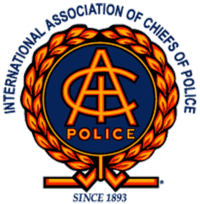International Association of Chiefs of Police
- For other uses, see IACP (disambiguation).
 | |
| Abbreviation | IACP |
|---|---|
| Founded | May 1893[1] |
| Founders | 47 chiefs of police[1] |
| 53-0227813[2] | |
| Legal status | 501(c)(3) nonprofit organization |
| Headquarters | Alexandria, Virginia, United States[2] |
| Terrence M. Cunningham[3] | |
| Vincent Talucci[3] | |
Revenue (2014) | $24,479,448[2] |
| Expenses (2014) | $24,049,045[2] |
Employees (2013) | 132[2] |
Volunteers (2013) | 46[2] |
| Mission | To advance and promote the law enforcement profession, protect the safety of law enforcement officers drawing on the expertise and experiences of its membership and professional staff, address issues confronting law enforcement through advocacy, programs, research, and training.[2] |
| Website |
www |
Formerly called | National Chiefs of Police Union |
International Association of Chiefs of Police (IACP) is a 501(c)(3) nonprofit organization based in Alexandria, Virginia.
Mission
IACP's stated mission includes to:
- Advance the science and art of police services;
- Develop and disseminate improved administrative, technical and operational practices and promote their use in police work;
- Foster police cooperation and the exchange of information and experience among police administrators throughout the world;
- Bring about recruitment and training in the police profession of qualified persons;
- Encourage adherence of all police officers to high professional standards of performance and conduct.
Activities
IACP developed and/or promoted many tools currently used by law enforcement agencies. These tools include the use of fingerprints, Uniform Crime Reports and the Federal Bureau of Investigation's National Academy for state and local police.
The United Nations granted a Consultative Status to the IACP in the 1970s due to the IACPs work in several UN member nations. Also in the 1970s, the IACP developed a national bomb data center and turned this over to the FBI. See also U.S. Bomb Data Center.
Along with other activities, the IACP publishes Police Chief Magazine.[4]
Psychological Services Section
The Psychological Services Section of IACP has over a hundred members, primarily from the United States. They are recognized specialists in this field, including those employed by larger departments and independent consultants. The section has been in operation since 1986, and publishes guidelines for various types of police psychological services.
Past presidents
IACP Governing Body
The leadership of the International Association of Chiefs of Police includes the Governing Body[6]
- President-Terrence M. Cunningham, Police Chief, Wellesley, Massachusetts
- Immediate Past President-Craig T. Steckler, Police Chief, Fremont, California
- First Vice President-Richard Beary, Police Chief, University of Central Florida, Orlando, Florida
- Second Vice President-Ronal W. Serpas, Police Superintendent, New Orleans, Louisiana
- Third Vice President-Terry M. Cunningham, Police Chief, Wellesley, Massachusetts
- Fourth Vice President-Don W. De Lucca, Police Chief, Golden Beach, Florida
- Vice President at Large-James Craze, Police Chief, Greenbelt, Maryland
- Vice President at Large-Kent Barker, Police Chief, Tualatin, Oregon
- International Vice President-Barbara Fleury, Chief Superintendent, Royal Canadian Mounted Police,
- Vice President-Treasurer-Dwight Henninger, Police Chief, Vail, Colorado
- SACOP General Chair-Peter L. Carnes, Chief of Police/Director of Campus Safety, Stonehill College, Easton, Massachusetts
- General Chair, Division of State and Provincial Police-Mike Edmonson, Superintendent, Louisiana State Police
- Parliamentarian-James McLaughlin, General Counsel/Executive Director, Texas Police Chiefs Association
History
Forty-seven chiefs of police from cities in the United States met in Chicago in May 1893.[1] At the meeting, the organization was founded as the National Chiefs of Police Union.[1] The founders of the organization sought to establish a central police bureau to improve detection and prevention of crime in the United States as well as to foster an exchange of ideas and information related to law enforcement.[1]
At the Chicago meeting, Chief W.S. Seavey of Omaha, Nebraska, was elected the organization's first president.[7] Chief Harvey O. Carr of Grand Rapids, Michigan, was the first treasurer and secretary.[7]
See also
References
- 1 2 3 4 5 "Chiefs of Police Coming: They Will Discuss Matters Relating to Their Officials Duties". The Washington Post. February 11, 1895. p. 8.
- 1 2 3 4 5 6 7 "Form 990: Return of Organization Exempt from Income Tax". International Association of Chiefs of Police. Guidestar. September 30, 2014.
- 1 2 "Board of Officers". International Association of Chiefs of Police. Retrieved July 20, 2016.
- ↑ "Police Chief Magazine". Retrieved 2007-12-18.
- ↑ "Police History". North Carolina Wesleyan College. Retrieved 2009-07-27.
Professionalism took place at the top with formation of the International Association of Chiefs of Police (IACP) in 1902. Its first president, Richard Sylvester, chief of the Washington D.C. P.D., was widely regarded as the father of police professionalism. He advocated a citizen-soldier model, and was responsible for development of the many paramilitary aspects of policing.
- ↑ Governing Body-International Association of Chiefs of Police
- 1 2 "A Council of Chiefs: A Notable Gathering of Police Officials in This City in May". The Washington Post. March 26, 1895. p. 6.
- "Uniform Crime Reporting Handbook". Federal Bureau of Investigation. 2004.
